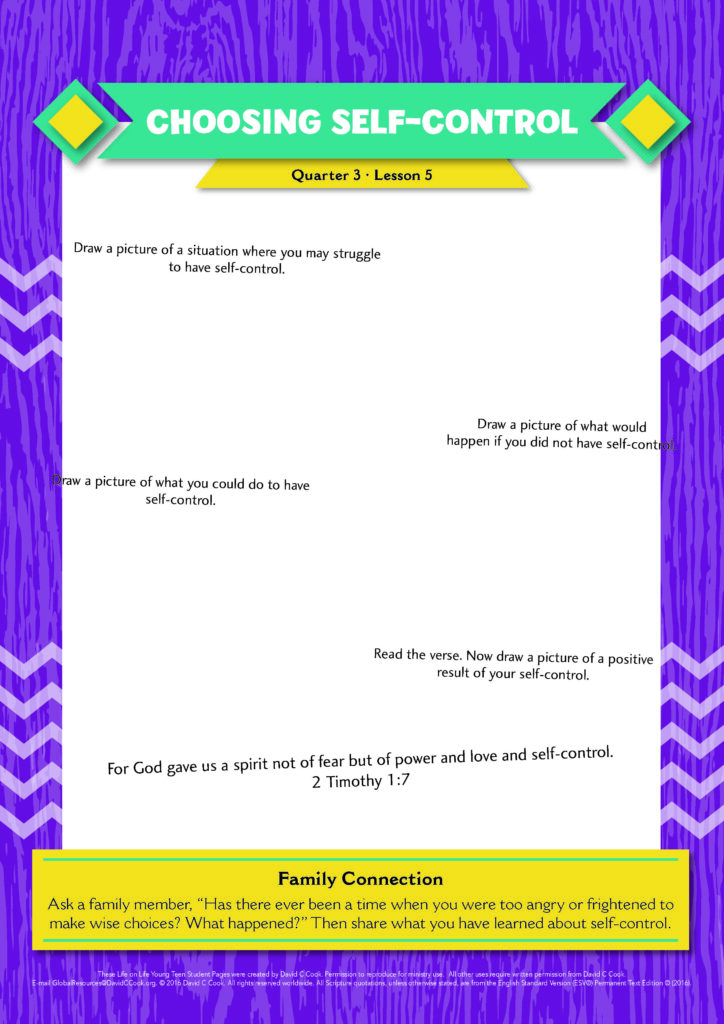During the lesson, the information for you to know is written in regular type, and what we suggest speaking or reading aloud to children is in bold. All resources for this lesson, including the Teacher Guide and Student Page, can be downloaded in a ZIP file by clicking on the following link:
In some lessons you will find "resource articles." These are articles written by experts from around the world to help equip you for your work with children and adolescents. Share them with parents or guardians if you consider it appropriate.
May these words of my mouth and this meditation of my heart be pleasing in your sight, Lord, my Rock and my Redeemer.
Psalm 19:14
On the night before Jesus was crucified, a crowd of Roman soldiers and officers from the chief priests came to arrest Him. Jesus’ disciple, Simon Peter, overcome by his emotions, cut off the ear of 1 of the men with a sword. Though Peter did not use self-control in this situation, Jesus was still able to use him. Later Jesus used Peter to start His Church!
Jesus knows we often allow our anger, frustration, or fear to affect our words and actions. He knows that we will say unkind things to others when we are hurt or angry or afraid. Can you think of a time when your lack of self-control caused you to make poor choices? Can you think of a time when choosing self- control could have prevented an argument or saved a relationship? Be encouraged! The Holy Spirit can help you to grow in self-control. He can help you to become a kind, gentle, loving person filled with self-control.
Encourage the students to ask their family members, “Has there ever been a time when you were too angry or frightened to make wise choices? What happened?”They can then share what they learned about self-control.
Teacher Tip: If possible, email or text the Family Connection Card to the families of your students.
Welcome your students to class. Let them know that you will be talking about self-control. Tell them you will start class with a fun physical activity.
Stand with your feet shoulder-width apart. Raise your right arm straight out in front of you. Leaving your arm out and keeping it straight, bend slightly at the waist, and slowly lift your left leg straight out behind you. Hold this position as long as you can.
Count slowly until the last student is unable to maintain the pose. Most students will lose their balance quickly. Encourage them to try again if they lose their balance too quickly.
Now we will do the same pose, only this time with our left arms and right legs. And this time we will slowly move them out at the same time. Ready? Start!
Count slowly until the last student is unable to maintain the pose. Again, encourage the students to try once more if they lose their balance too quickly.
Now stand with your legs close together. Bend your right leg and lift your right foot behind you. Grab that foot with your right hand. Slowly raise your left hand straight up above you. Now slowly bend forward. Your arm will be extended in front of you. How long can you keep your balance?
Count slowly until the last student is unable to maintain the pose.
If we practiced these exercises every day, they would get easier. Our bodies would grow stronger, and our balance would improve. These exercises tested our body control. It takes self-control, muscle strength, and practice to become good at these exercises. The same is true of self-control.
Having self-control means that we do not let our emotions or desires control our behaviour. It means that we think about how our words and actions will affect others before we speak and act.
Let me give you an example. Nshuti was having a very bad day. Nshuti’s older brother was always causing trouble. He and his friends often skipped school, stole food and money, and got into fights. Nshuti’s brother tried to get him to join them. Nshuti was feeling frustrated and angry because his brother had called him offensive names and mocked him for going to Bible class. Nshuti tried to do well in school and loved going to Bible class. Nshuti clenched his fists in anger as he walked. Nshuti felt angry at everyone. He wanted to punch something.
Nshuti saw another teen on the path. Mihigo was smaller and weaker than Nshuti. Nshuti called him a bad name. Mihigo kept walking. Nshuti ran up behind Mihigo and began hitting him. Mihigo fell to the ground and rolled up into a ball to protect himself. Nshuti kicked him and walked away.
Experiencing emotions is not wrong. Our emotions can help us know what to do. In this situation, Nshuti was angry and frustrated, but there were better ways to handle his feelings. He could have tried to talk to his brother. He could have asked someone to help him. He could have asked God to help him to have peace and patience in the situation.
Nshuti’s brother and Nshuti did not choose self-control.
Mihigo was hurt by Nshuti’s lack of self-control.
Mihigo chose self-control.
Allow 2–3 students to share. Remind them to not share names but only how this affected them.
He was probably frustrated, angry, tense, and maybe afraid.
When someone has strong emotions like this, it affects you. In this story, Nshuti was squeezing his hands into fists even before he saw Mihigo. He may have been breathing faster and harder. His heart may have been beating fast. He might have felt hot. Remember when we learned about anger a while ago? These are all signs that Nshuti could have used to recognize that he was angry and needed to control his anger. If he had recognized these signs, he might have realized they were signals that he needed to use self-control.
Often in this type of situation, we do not think—we just react. Think about how your body felt at that time. Now, think about your emotions. Remember, feeling angry or afraid or experiencing some other strong emotion is not sinful. Even Jesus was angry and sad. But it is sinful when we let our emotions and our desires control our behaviour.
Have each student find a partner.
Think about a time when you felt a really strong emotion, such as anger, fear, or frustration.
Give students a moment to think of their own situations. You might want to share something from your own life, including how you reacted.
Share about your situation with your partner. Answer these questions as you share with your partner.
Give the students 2–3 minutes to share with their partners. Some students may not want to share their situations, but they should still listen to their partners’ stories. When they are done sharing with their partners, allow 2–3 students to share with the whole group.
Sometimes when we feel a strong emotion such as anger or frustration, we react in a bad way without even thinking about it first. To choose self-control, we must think before we act. Here are some tips to help you use self-control:
Listen now to these verses that talk about self-control.
Ask a student to read Galatians 5:22–23 aloud from the Bible.
But the fruit of the Spirit is love, joy, peace, forbearance, kindness, goodness, faithfulness, gentleness and self-control. Against such things there is no law.
Galatians 5:22–23
Did you hear self-control in that list? The Bible tells us that self-control is a fruit God produces as His Spirit works in Christians. As we grow in self-control, we can stop doing things that can hurt or upset others. Instead we can show care toward others. Everyone, Christian or not Christian, can practice self-control. But the good news for Christians is that the Holy Spirit can help us.
Let’s see how well you can use these tips in some real-life situations.
Pick 6 volunteers. You will read a situation, and 2 of the volunteers will act it out. After each situation, ask the question to the whole group, so they can give suggestions about how to use self-control.
Thank the actors, and affirm the whole class for sharing great ideas.
Remember the exercises we did at the beginning of class? If we practiced those exercises, we would develop our muscle strength and our balance. It would be easier to hold those positions for a longer time. It is the same with self-control. Self-control takes practice. Many of us are not used to choosing self-control. When we feel angry or frustrated, we let our emotions or desires control us. However, the more we choose self-control, the easier it will become.
There is something else you can do to help with self-control. Think again about the exercises. Imagine that someone was standing close to you during these exercises. When you started to lose your balance, you could ask this person to help you. Would this have made the exercises easier? Of course!
Students may answer that friends, trusted adults, and God can help them to have self-control.
Optional: If you are using the Student Pages, allow the students to draw about situations in their own lives where they need to choose self-control.

In life, we are not alone if we trust in God! He promises that He will never leave us. When you are angry or sad or frustrated, God is with you! This does not mean God will make your choices for you. You make your own decisions. You can choose to lose control and hurt yourself and others—or you can choose self-control. But if you ask God to help you, He will. He will give you the strength and courage to choose self-control.
Ask a student to read 2 Timothy 1:7 aloud from the Bible.
God gave us a spirit not of fear but of power and love and self-control.
2 Timothy 1:7, ESV

Show the students the 2 Timothy 1:7 poster from the end of this lesson. (If you have tape, you can tape it to the wall.)
Stand with your partner from earlier in the lesson. You and your partner will take turns reciting 2 Timothy 1:7 to each other. Say the verse to each other 3 times. Then, pray this verse with your partner by slowly saying it with your partner’s name. For example, “God gave (your partner’s name) a spirit …” Add your own words to the prayer if you want.
Give the students time to pray for each other. When they are finished, close with this blessing based on Titus 2:11–12.
Blessing: May the grace of God that brings salvation help you to live a self-controlled, upright, and godly life. May the wisdom of God be with you as you practice choosing patience instead of anger.
Lead the students in singing this quarter’s song if possible.
Life on Life ©2020 David C Cook. Reproducible for home or classroom use only. All other uses require written permission from David C Cook [email protected]. All rights reserved.